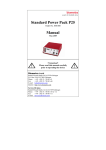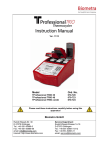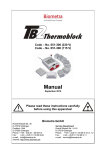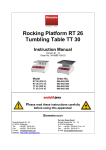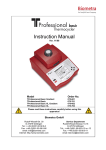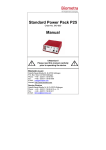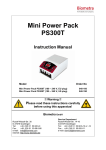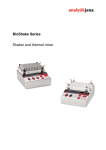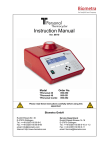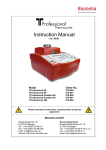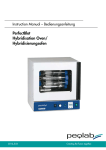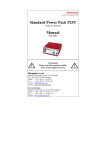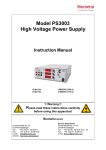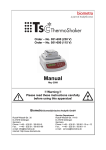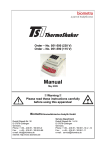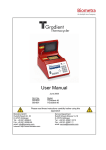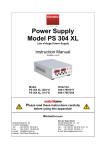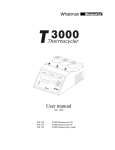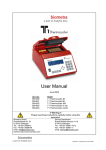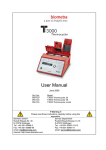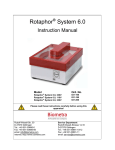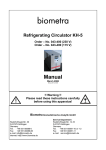Download Hybridization Ovens User Manual
Transcript
Hybridisation Ovens Instruction Manual Ver. 09/10 Modell Best. Nr. Mini-Hybridisation Oven OV1 (230V) Mini-Hybridisation Oven OV1 (115V) Mini-Hybridisation Oven OV2 (230V) Mini-Hybridisation Oven OV2 (115V) Mini-Shaking-Hybridisation Oven OV3 (230V) Mini-Shaking-Hybridisation Oven OV3 (115V) Duo-Therm-Hybridisation Oven OV5 (230V) Duo-Therm-Hybridisation Oven OV5 (230V) 052-000 052-090 052-100 052-190 052-200 052-290 052-300 052-390 Please read these instructions carefully before using this apparatus! Biometra GmbH Rudolf-Wissell-Str. 30 D-37079 Göttingen Tel.: ++49 (0)551-50 68 6-0 Fax: ++49 (0)551-50 68 6-66 email: [email protected] Internet: http://www.biometra.com Service Department Rudolf-Wissell-Strasse 14-16 D-37079 Göttingen Tel.: ++49 (0)551-50 68 6-10 or -12 Fax: ++49 (0)551-50 68 6-11 email: [email protected] This document describes the state at the time of publishing. It needs not necessarily agree with future versions. Subject to change! 2 Instruction Manual Hybridisation Ovens 10/2009 Contents 1 Introduction......................................................................................................................... 5 1.1 Field of Applications ......................................................................................................... 5 1.2 Special features................................................................................................................ 5 1.2.1 Vacuum double glass door ................................................................................... 5 1.2.2 Rotor and oven interior ......................................................................................... 5 1.2.3 Shaking platform................................................................................................... 5 1.3 Technical specifications.................................................................................................... 5 1.3.1 Temperature ......................................................................................................... 5 1.3.2 Rotor ..................................................................................................................... 5 1.3.3 Rotor speed .......................................................................................................... 6 1.3.4 Electrical connection values ................................................................................. 6 1.3.5 Dimensions ........................................................................................................... 6 1.4 Legal Notes ...................................................................................................................... 6 1.4.1 Copyright .............................................................................................................. 6 1.4.2 Liability.................................................................................................................. 7 1.4.3 Meaning of the Instructions................................................................................... 7 2 Safety and Warning Notices .............................................................................................. 8 2.1 Definition of Symbols........................................................................................................ 8 2.2 General Safety Instructions .............................................................................................. 8 3 Installation......................................................................................................................... 10 3.1 Content of delivery.......................................................................................................... 10 3.2 Unpack and Check ......................................................................................................... 10 3.3 Installation Conditions .................................................................................................... 10 3.4 Operating elements ........................................................................................................ 11 4 Operating........................................................................................................................... 12 4.1 Switching on ................................................................................................................... 12 4.2 Display of the set temperature........................................................................................ 12 4.3 Setting the temperature .................................................................................................. 12 4.4 Set rotor speed and shaking frequency.......................................................................... 13 4.5 Inserting the hybridisation bottles ................................................................................... 13 4.6 Removing the hybridisation bottles................................................................................. 13 4.7 Auto Restart.................................................................................................................... 14 4.8 Working at ambient temperature .................................................................................... 14 5 Accessories: ..................................................................................................................... 15 6 Service............................................................................................................................... 16 6.1 Instructions for return shipment ...................................................................................... 16 Instruction Manual Hybridisation Ovens 10/2009 3 6.2 Equipment Decontamination Certificate..........................................................................17 7 Note for the disposal of electric / electronic waste. ......................................................19 8 EU - Konformitätserklärung/ EU - Declaration of Conformity .......................................20 9 Warranty.............................................................................................................................21 10 4 Subject index.................................................................................................................22 Instruction Manual Hybridisation Ovens 10/2009 1 Introduction 1.1 Field of Applications The hybridization ovens described herein have been designed for incubation of materials in closed and heat resistant vessels (bottles, basins) within the conditions described in chapter 1.3.4, technical data. The ovens are not suited for incubation in open vessels or for drying of glasses or other things. 1.2 Special features 1.2.1 Vacuum double glass door The ovens OV2, 3 und 5 have a metal framed double glass vacuum door. The door protects the user as far as possible from low energy radiation like β-emission and provides for optimal thermal insulation. 1.2.2 Rotor and oven interior All ovens have at least one rotor that can be equipped with different size spring clamps and therefore offers maximal flexibility. Underneath the rotor is drip tray made of stainless steel that safely collects spills that may occur. Moreover the complete oven interior is lined with easy to clean stainless steel. 1.2.3 Shaking platform The ovens OV3 and OV5 are equipped with an additional platform that shakes with 1 to 10 rpm and may be used for different kind of applications. 1.3 Technical specifications 1.3.1 Temperature - Digital temperature setting: Ambient temperature to 85 oC (0,1 oC steps) - Regulation range: Ambient temperature +10oC to 85oC - Digital display of actual temperature: Ambient temperature to 85.0oC ±0,1 oC - Heating up from 20 to 60 oC: ≤ 15 min - Temperature varieties inside the chamber: ± 1.0 oC Note: In the DUO-Therm Hybridisation oven, in case of using both chambers at the same time, the minimal regulation temperature in the chamber used with the lower temperature may be shifted to a higher temperature. 1.3.2 Rotor Capacity • 6 large hybridisation bottles (300 x 35 mm) or Instruction Manual Hybridisation Ovens 10/2009 5 • 12 medium hybridisation bottles (150 x 35 mm) • 12 small hybridisation bottles (100 x 35 mm) or 1.3.3 Rotor speed Continuously adjustable: about 1 to 9.5 rpm (Shaking speed: Mini-Shaking-Hybridisation oven OV3 and DUO-Therm Hybridisation oven OV5: about 10 to 160 times back and forth) 1.3.4 Electrical connection values - Power supply: 230 Volts, 50Hz (052-000,-100,-200,-300) 115 Volts 50/60 Hz (052-090,-190,-290,-390) - maximum power consumption: 0.63 kW (OV5), 0.32 kW (OV3), 0.31 kW (OV1/2) - Fuses: 2 x 2.0 AT (OV1,2/230 Volt), 2 x 3.15 AT (OV3/230 Volts) 2 x 4 AT (OV5/230 Volts), 2 x 3.15 AT (OV1,2/115 Volts, 2 x 4.0 AT (OV3/115 Volts), 2 x 8 AT (OV5/115 Volts) - class: IP20 - ambient conditions: 15 oC to 30 oC; ≤ 85% relative humidity 1.3.5 Dimensions (B x T x H) Outer dimensions 433 x 400 x 432 mm (OV1, OV2) 433 x 400 x 605 mm (OV3) 433 x 400 x 726 mm (OV5) Chamber dimensions 355 x 240 x 245 mm (OV1, OV2) 355 x 240 x 400 mm (OV3) 355 x 240 x 245 mm (OV5) Weight (excluding bottle and mains cable) 20,05 kg (OV1); 21,25 kg (OV2) 26.05 kg (OV3); 36,25 kg (OV 5) 1.4 Legal Notes 1.4.1 Copyright All rights reserved. It is not allowed to copy and publish the manual or parts of it in any form as copies, micro film or other methods without a written authorisation from Biometra. Biometra is pointing out that applied company and brand names are usually protected trade marks. 6 Instruction Manual Hybridisation Ovens 10/2009 1.4.2 Liability Biometra is not liable for damages and injuries caused by use not considering these operating instructions in parts or completely. 1.4.3 Meaning of the Instructions Biometra recommends that you first read these instructions carefully. This operation instruction is part of the product and should be kept over the full life-time of the instrument. It should also be forwarded to subsequent owners and users. Make sure that additions and updates are inserted into the operation instructions. Instruction Manual Hybridisation Ovens 10/2009 7 2 Safety and Warning Notices 2.1 Definition of Symbols Symbol Definition Caution! Refer to instruction manual! Danger! High voltage! Fragile! Danger! Hot surface! 2.2 General Safety Instructions Please read this manual carefully before starting operation the hybridisation ovens General safety precautions for laboratory work must be observed when working with the instrument. Parts in the oven and parts of the housing may be heated to up to 85 °C. Avoid any contact especially with metal parts, hybridization bottles and solutions at high temperatures in the bottles: Danger of burning! Hybridization bottles containing hot solutions must not be opened or handled without safety protection. Bottles containing hybridization solution must not be transferred rapidly from high to low temperature or vice verse. Danger of explosion! When opening hybridization bottles at high temperatures hot steam will escape: Danger of burning and contamination. Due to the sealing and heat insulation of the incubation chambers, cooling down takes quite some time with doors closed. Danger of burning after too short cooling times! Before unscrewing parts to open the housing of the oven disconnect it from the mains power: Danger by electric shock! Open vessels with aqueous solutions must not be used in the oven. Vapor may condense on inner surfaces and penetrate into drive and electronics. Biometra hybridisation ovens contain no user serviceable parts. Do not open the instrument housing! Service and repair may only be carried out by the Biometra Service department or otherwise qualified technical personal. 8 Instruction Manual Hybridisation Ovens 10/2009 Do not use the instrument when damages of the housing, block, cable or other parts are visible. This instrument is designed and certified to meet EN 61010-1 safety standards. It should not be modified or altered in any way. Alteration of this instrument will void the warranty, void the EN61010-1 certification, and create a potential safety hazard. The instrument must not be used to dry, temperate or shake substances that may lead to concentrating an explosive gas inside the oven. When using Biometra hybridisation bottles, a temperature of 70 °C Celsius must not be exceeded. Closed vessels must be suited for the vapor pressure resulting from the temperature chosen. Make sure that the appliance connector and the plug of the supply cord are accessible, so you can separate the instrument from the mains. Connect the hybridisation oven to a grounded socket. Appropriate safety regulations must be observed when working with infectious, pathogenic or radioactive material. Ask the responsible local safety inspector for details. The hybridisation oven must not be used with explosive, flammable or volatile liquids. Do not move the rotor by hand. To change the rotor position, close the hybridization oven door and switch the rotor "on". Be careful when loading the oven with sharp or hard items. Do not abut against the glass door! Danger of breakage of glass and implosion. Do not use abrasives to clean the instrument. For transports always use the original Biometra box. Instruction Manual Hybridisation Ovens 10/2009 9 3 Installation 3.1 Content of delivery a) b) c) d) e) f) Hybridisation oven Dip tray/shaking platform Rotor wide-necked hybridization bottles (300 x 35 mm) with meshes (5 pcs., 230 x 230 mm) Power cable Instruction manual Please keep the original packaging material for return shipment in case of servicing 3.2 Unpack and Check Unpack and carefully examine the instrument. Report any damage to Biometra. Do not attempt to operate this device if physical damage is present. Please keep the original packing material for return shipment in case of service issues !! Attention !! Please fill out and send back the warranty registration card. This is important for you to claim full warranty. 3.3 Installation Conditions • Place the hybridisation oven on a stable surface in a dry, safe environment. • Let equilibrate the hybridisation oven to room temperature before starting operation (1 to 6h). • Make sure that the appliance connector and the plug of the supply cord are accessible, so you can separate the instrument from the mains. • Connect the hybridisation oven to a grounded socket. • The maximum temperature that can be used in the Biometra hybridization ovens OV 1,2,3 or OV 5 is 85 °C. Higher values should not be set, as the built in temperature fuse will switch off the heater at about 90 degrees. The fuse will start the heater again after cooling down. Thereby of course an undefined temperature regulation with temperature fluctuating a lot will result. Note: When opening the doors, rotor, shaking platform, fan and heater will be switched off from safety reasons. The temperature setting will remain in store and the oven will heat to the set temperature again as soon as the door is closed. • 10 The rotors in the incubation chambers can hold up to 6 large bottles (300 x 35 mm) or six small bottles (150 x 35 mm or 100 x 35 mm). Any combination of large and small bottles can be used. The rotor speed can be set from about 1 to 9.5 revolutions per minute. For longest lifetime of the drive system the rotor should be loaded as balanced as possible; e. g. when Instruction Manual Hybridisation Ovens 10/2009 three bottles are incubated do not place them beside each other but leave one clamp empty before placing the next. If just one bottle is used an empty bottle should be placed opposite to it. • Make sure that the ventilation slots on the bottom and the rear are not obstructed. Make sure that there is no object underneath the instrument that may block the ventilation slots at the bottom (e.g. a piece of paper etc.) • There must be sufficient distance between the ventilation slots on the rear side of the hybridisation oven and a wall or another instrument (min 10 cm). Ensure that both the rear and bottom ventilation slits of the rear and bottom of the instrument are unobstructed. Insufficient ventilation can cause overheating of the instrument. 3.4 Operating elements function Key Description switch (Green) Power Mains switch for on/off set keys ∇Δ set-temperature value Key “SET” Set temperature Turning knob rotor LCD-display ╔═══╗ ╚═══╝ Instruction Manual Hybridisation Ovens 10/2009 Setting and storing of desired temperature Set rotor speed Actual temperature = red, set temperature = green 11 4 4.1 Operating Switching on After switching on the oven (Power-switch) the display will show the actual temperature in the oven and the last set temperature value. Heating up to the set temperature starts immediately. The rotor starts turning immediately after switching on as well, in case the turning knob for the rotor speed is not at the left stop. The shaking platform starts moving with the speed set, too. When starting the shaking platform a slow speed should be chosen. The speed then can be regulated up adequate to the vessels placed on the shaking platform. When placing the shaking platform into the oven care must be taken the drive slips into the central guide rail. The upper red display shows the actual temperature inside the oven chamber; the lower green display shows the temperature value set (see chapter 4.2). In continuous use, after heating up, both displays will show the same temperature. 4.2 Display of the set temperature The set temperature is shown in the lower green display °C 058.3 SV 065.0 Actual temperature (red) Set temperature (green) SET 4.3 Setting the temperature The temperature is set by pressing the ∇ and Δ keys on the controller (Increase Δ or decrease ∇ the value). Therefore first the SET key is pressed until “SV” starts blinking left above the set value. Now one of the ∇ Δ keys is pressed several times or permanently. With a key kept pressed the set value increases/decreases slowly at first. The longer the key is held the faster the set temperature value will change. This allows the user to easily perform large temperature changes. 12 Instruction Manual Hybridisation Ovens 10/2009 The new temperature value set must be confirmed by the SET key (SV is not blinking any more). Immediately after confirmation the controller will regulate to the new temperature. Note: The set temperature should be at least 10oC above the ambient temperature. Otherwise in continuous use the set temperature might be exceeded. 4.4 Set rotor speed and shaking frequency At the left limit of the knob for setting the rotor speed is the function to turn the rotor on or off. To switch the rotor drive off turn the knob counter clock wise over the left limit. The ovens containing an integrated shaker (Mini-Shaking-Hybridization oven OV3 and DUOThermo Hybridization oven OV5) provide an additional turning knob marked “Shaker” for the shaking speed; this one as well has an on/off switch at the left stop. In the OV 3 it can be used together with the rotor, in case the vessels to be shaken are not higher than16.5 cm. The shaking speed can be set from about 10 to 160 per minute. 4.5 Inserting the hybridisation bottles The rotor axis is connected to the drive by a coupler, it fits in two positions. After positioning the rotor in the coupler on the left side it must be slightly pushed to the left and afterwards downwards into the holder on the right side. By slightly lifting the rotor on the right side it can be taken out. To load the bottles the rotor should be taken out of the oven. This way the bottles can be pushed into the clamps from the sides. Pushing the bottles into the rotor from the front side may dilate the clamps after some time. Clamps can be exchanged easily and are available as spare parts. To additionally allow the hybridization solution to move back and forth the bottles can be placed slightly inclined. Therefore the left clamp disk on the rotor can be dismantled by a knurled screw on the axis on the disks inner side. The left clamp disk can be fixed in any position by this knurled screw. 4.6 Removing the hybridisation bottles To remove the bottles take out the rotor from the instrument (see chapter 4.5) and pull the bottles out of the spring clamps from the side. Pulling out the bottles off the rotor from the front side may dilate the clamps after some time. Hybridization bottles containing hot solutions must not be opened or handled without safety protection. Bottles containing hybridization solution must not be transferred rapidly from high to low temperature or vice verse. Danger of explosion! When opening hybridization bottles at high temperatures hot steam will escape: Danger of burning and contamination. Parts in the oven and parts of the housing may be heated to up to 85 °C. Avoid any contact especially with metal parts, hybridization bottles and solutions at high temperatures in the bottles: Danger of burning! In case the hybridization oven is not used for a longer period please remove all liquids from the bottles and from inside the chambers. Remove the rotor from the oven and also remove all bottles from the rotor clamps. Instruction Manual Hybridisation Ovens 10/2009 13 4.7 Auto Restart The hybridization ovens OV1, OV2, OV3 and OV5 have an auto restart function. In case the mains power supply is interrupted for a few seconds up to several hours the oven will restart automatically as soon as the power is present again. The last temperature set will be regulated to. 4.8 Working at ambient temperature For working at ambient temperature the value should be set to about five degrees below the ambient temperature in the laboratory. The controller this way will never switch on the heater. 14 Instruction Manual Hybridisation Ovens 10/2009 5 Accessories: Hybridisation bottle 300 x 35 mm 052-001 Hybridisation bottle 150 x 35 mm 052-002 Hybridisation bottle 100 x 35 mm 052-003 Spare lid (incl. O-ring) 052-011 O-ring for lid 052-012 Meshes, 5 pieces 230 x 230 mm 052-005 Meshes, 5 pieces 150 x 100 mm 052-105 Instruction Manual Hybridisation Ovens 10/2009 15 6 Service Should you have any problems with this unit, please contact our service department or your local Biometra dealer: Biometra GmbH Service Department Rudolf-Wissell-Straße 14 - 16 D-37079 Göttingen Phone:++49 (0)5 51 50 68 6 - 10 or 12 Fax: ++49 (0)5 51 50 68 6 -11 e-mail: [email protected] If you would like to send the unit back to us, please read the following return instructions in chapter 6.1. 6.1 Instructions for return shipment In case of an instrument failure that cannot be fixed please proceed as follows: • • • • Return only defective devices. For technical problems which are not definitively recognisable as device faults please contact the Technical Service Department at Biometra (Tel.: +49 55150881-10/12, Fax: +49 551-50881-11, e-mail: [email protected]). Please contact our service department for providing a return authorization number (RAN). This number has to be applied clearly visible to the outer box. Returns without the RAN will be not be accepted! Important: Carefully clean all parts of the instrument of biologically dangerous, chemical or radioactive contaminants. If an instrument is contaminated, Biometra will be forced to refuse to accept the device. The sender of the repair order will be held liable for possible losses resulting from insufficient decontamination of the device. Please prepare written confirmation that the device is free from biologically dangerous and radioactive contaminants. The declaration of decontamination (see section 6.2) must be attached to the outside of the packaging. • Use the original packing material. If not available, contact Biometra or your local distributor. • Label the outside of the box with “CAUTION! SENSITIVE ELECTRONIC INSTRUMENT!” • Please enclose a note which contains the following: 16 a) Sender’s name and address, b) Name of a contact person for further inquiries with telephone number, c) Description of the fault, which also reveals during which procedures the fault occurred, if possible Instruction Manual Hybridisation Ovens 10/2009 6.2 Equipment Decontamination Certificate To enable us to comply with german law (i.e. §71 StrlSchV, §17 GefStoffV and §19 ChemG) and to avoid exposure to hazardous materials during handling or repair, please complete this form, prior to the equipment leaving your laboratory. COMPANY / INSTITUTE __________________________________________________ ADDRESS ______________________________________________________________ PHONE NO _________________________ E-MAIL ______________________________________________________________ EQUIPMENT FAX NO_________________________ Model ______________ Serial No ______________ ______________ ______________ ______________ ______________ ______________ ______________ If on loan / evaluation Start Date: __________________ Finish Date __________________ Hazardous materials used with this equipment: __________________________________________________________________________ __________________________________________________________________________ __________________________________________________________________________ Method of cleaning / decontamination: __________________________________________________________________________ __________________________________________________________________________ __________________________________________________________________________ The equipment has been cleaned and decontaminated: NAME __________________________________ POSITION _______________________ (HEAD OF DIV./ DEP./ INSTITUTE / COMPANY) SIGNED ________________________________ DATE ____________________________ PLEASE RETURN THIS FORM TO BIOMETRA GMBH OR YOUR LOCAL BIOMETRA DISTRIBUTOR TOGETHER WITH THE EQUIPMENT. PLEASE ATTACH THIS CERTIFICATE OUTSIDE THE PACKAGING. INSTRUMENTS WITHOUT THIS CERTIFICATE ATTACHED WILL BE RETURNED TO SENDER. Instruction Manual Hybridisation Ovens 10/2009 17 General Information for Decontamination: Please contact your responsible health & safety officer for details. Use of radioactive substances: Please contact your responsible person for details. Use of genetically change organism or parts of those: Please contact your responsible person for details. 18 Instruction Manual Hybridisation Ovens 10/2009 7 Note for the disposal of electric / electronic waste. Note for disposal of electric / electronic waste Hinweis für die Entsorgung von Elektroaltgeräten Renseignement du traitement des déchets des appareils électrique / électronique This symbol (the crossed-out wheelie bin) means, that this product should be brought to the return and / or separate systems available to end-users according to yours country regulations, when this product has reached the end of its lifetime. For details, please contact your local distributor! This symbol applies only to the countries within the EEA*. EEA = European Economics Area, comprising all EU-members plus Norway, Iceland and Liechtenstein. ------------------------------------------------------------------------------------------------------------------------------Dieses Symbol (die durchgestrichene Abfalltonne) bedeutet, dass dieses Produkt von der Firma Biometra für eine kostenlose Entsorgung zurückgenommen wird. Dies gilt nur für Geräte, die innerhalb Deutschlands gekauft worden sind. Kontaktieren Sie für die Entsorgung bitte die Biometra Service-Abteilung! Außerhalb Deutschlands wenden Sie sich bitte an den lokalen Händler. Dieses Symbol gilt nur in Staaten des EWR*. *EWR = Europäischer Wirtschaftsraum, umfasst die EU-Mitgliedsstaaten sowie Norwegen, Island und Liechtenstein. ------------------------------------------------------------------------------------------------------------------------------Cet symbol (conteneur à déchets barré d´une croix) signifie que le produit, en fin de vie, doit être retourné à un des systèmes de collecte mis à la disposition des utilisateurs finaux en conséquence des régulations par la loi de votre pays. Pour des information additionel nous Vous demandons de contacter votre distributeur! Cet symbole s´ápplique uniquement aux pays de l´EEE*. EEE = Espace économique européen, qui regroupe les États membres de l´UE et la Norvège, Islande et le Liechtenstein. Instruction Manual Hybridisation Ovens 10/2009 19 8 EU - Konformitätserklärung/ Conformity EU - Declaration of Göttingen, den 24. 08. 2004 im Sinne der EG-Richtlinie über elektrische Betriebsmittel zur Verwendung innerhalb bestimmter Spannungsgrenzen 73/23/EWG following the EC directive about electrical equipment for use within certain limits of voltage 73/23/EEC und / and im Sinne der EG-Richtlinie für die elektromagnetische Verträglichkeit 89/336/EWG. following the EC directive about the electromagnetic compatibility 89/336/EEC . Hiermit erklären wir, daß folgende Hybridisierungsöfen Herewith we declare that the following Hybridization Ovens Typen / types: Mini-Hybridisierungsofen OV1, Mini-Hybridisierungsofen OV2, Mini-ShakingHybridisierungsofen OV3, DUO-Therm Hybridisierungsofen OV5 Mini-Hybridization Oven OV1, Mini Hybridization Oven OV2, Mini Shaking Hybridization Oven OV3, DUO-Therm Hybridization Oven OV5 Best.-Nr. / Order No 052-000, 052-090, 052-100, 052-190, 052-200, 052-290, 052-300, 052-390 den grundlegenden Anforderungen der corresponds to the basic requirements of EG-Niederspannungsrichtlinie 73/23/EWG und der EC low voltage directive 73/23/EEC and the EG-Richtlinie über die elektromagnetische Verträglichkeit 89/336/EWG entsprechen. EC directive about the electromagnetic compatibility 89/336/EEC . Folgende harmonisierte Normen wurden angewandt: The following harmonized standards have been used: EN 61000-3-3:1995 + A1:2001 Formular 006, Ver. 03 EN 55011:1998 + A1:1999 + A2:2000 EN 61000-3-2:2000 EN 61000-6-1:2001 EN 61010-1: 2004 Dr. Jürgen Otte Quality Manager 20 Instruction Manual Hybridisation Ovens 10/2009 9 Warranty This Biometra instrument has been carefully build, inspected and quality controlled before dispatch. Hereby Biometra warrants that this instrument conforms to the specifications given in this manual. This warranty covers defects in materials or workmanship as described under the following conditions: This warranty is valid for 24 month from date of shipment to the customer from Biometra. This warranty will not be extended to a third party without a written agreement of Biometra. This warranty covers only the instrument and all original accessories delivered with the instrument. This warranty is valid only if the instrument is operated as described in the manual. Biometra will repair or replace each part which is returned and found to be defective. This warranty does not apply to wear from normal use, failure to follow operating instructions, negligence or to parts altered or abused. Instruction Manual Hybridisation Ovens 10/2009 21 10 Subject index Accessories Auto Restart Declaration of Conformity Decontamination Certificate Disposal Hybridisation bottles Operating Operating elements 22 15 14 20 17 19 13 12 11 Rotor speed Safety and Warning Notices Safety precautions Service Shaking frequency Shaking platform Technical specifications Warranty 6, 13 8 8 16 13 5 5 21 Instruction Manual Hybridisation Ovens 10/2009






















